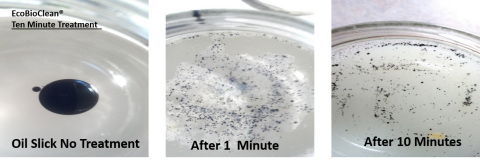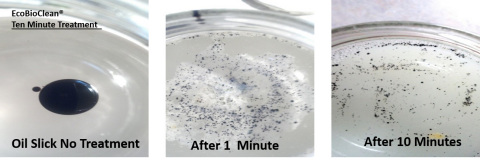CHICAGO--(BUSINESS WIRE)--Barrington, IL resident Janet Angel, CEO of JACOR LLC, has been selected to present a best practices case study discussing the scientific and ecological value of her patented EcoBioClean® technology before the United Nations Environment Programme (UNEP), the leading global environmental authority. Angel’s inventive discovery, a safer, less costly way to treat oil spills, was prompted by the devastating harm caused to the ocean following the Deepwater Horizon incident seven years ago.
Angel is one of only seven international entrepreneurs (and one of only two representatives from the United States) chosen by UNEP and the International Sustainable Chemistry Collaborating Center (ISC3) to speak at a joint workshop on September 14, 2017 in Berlin. The workshop is intended to advance entrepreneurship and start-up initiatives for sustainable chemistry. Participants will include Nobel laureates and other leaders from the environmental and scientific community.
Angel, whose background is in human chemistry, set about developing the EcoBioClean® technology shortly after the 2010 Deepwater Horizon disaster. Her cost-effective, comprehensive green chemistry application rapidly (under ten minutes) reduces a crude oil slick in salt or fresh water to tiny particles. It continues to biodegrade and transform those substances into beneficial materials suitable for aquatic or ground life with total remediation occurring in as little as seven days. The process is analogous to the way microorganisms break down organic waste into the chemical energy and nutrients needed for cellular maintenance and growth.
“As I considered what happened to the ocean following the Deepwater spill, I thought, ‘why not remove toxins from the ocean the way microorganisms and enzymes break down substances in nature?’” Angel explained.
Until now, attempts to treat toxic oil spills relied on methods that included burning off the floating layer of oil, using chemicals or churning the slick with spinners to disperse it, or employing soakers or booms to collect the oil and send the waste to landfills. But these approaches are unable to restore many sites to the public health and the environment standards set by environmental regulators.
Further, cleanup is costly. In 2010, BP spilled over 200 million gallons of crude into the Gulf and spent over $60 billion in cleanup costs. Treatment of the BP spill via EcoBioClean® would have cost $1.02 billion, one-sixtieth (1/60th) the cost.
“Despite preventative measures, there will continue to be oil and petrochemical spills due to accidents on drilling rigs, human error, degradation of underground piping, natural disasters, and more,” said Angel. “But we now have the benefit of promising technology that can mitigate this harm, reducing human health risks and protecting our environment.”
“I look forward to sharing our approach with the global scientific community at the U.N. and with other leaders in the public and private sectors in the near term,” Angel said.
To learn more about EcoBioClean® visit http://ecobioclean.com/




